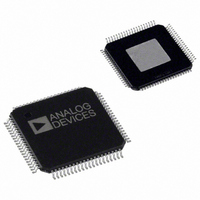AD9786BSVRL Analog Devices Inc, AD9786BSVRL Datasheet - Page 32

AD9786BSVRL
Manufacturer Part Number
AD9786BSVRL
Description
IC DAC 16BIT INTERPOL/SP 80TQFP
Manufacturer
Analog Devices Inc
Series
TxDAC+®r
Datasheet
1.AD9786BSVZRL.pdf
(56 pages)
Specifications of AD9786BSVRL
Number Of Bits
16
Data Interface
Parallel
Number Of Converters
1
Voltage Supply Source
Single Supply
Power Dissipation (max)
1.25W
Operating Temperature
-40°C ~ 85°C
Mounting Type
Surface Mount
Package / Case
80-TQFP Exposed Pad, 80-eTQFP, 80-HTQFP, 80-VQFP
For Use With
AD9786-EB - BOARD EVALUATION FOR AD9786
Lead Free Status / RoHS Status
Contains lead / RoHS non-compliant
Settling Time
-
AD9786
REAL AND COMPLEX SIGNALS
A complex signal contains both magnitude and phase
information. Given two signals at the same frequency, if the
leading signal in phase is cosinusoidal and the lagging signal is
sinusoidal, information pertaining to the magnitude and phase of
a combination of the two signals can be derived; the combination
of the two signals can be considered a complex signal. The cosine
and sine can be represented as a series of exponentials, recalling
that a multiplication by j is a counterclockwise rotation about
the Re/Im plane. The phasor representation of a complex signal
with Frequency f is shown in Figure 58.
Im
Acos(2πft) = A
2πft
Asin(2πft) = A
Figure 58. Complex Phasor Representation
C
A
C = Ae
Re
2πft
e
e
+j2πft
+j2πft
= Acos(2πft) + jAsin(2πft)
2j
+ e
2
+ e
Im
–j2πft
–j2πft
=
=
–f
A
A
2
2
A/2
[
[
Re
e
je
+j2πft
A/2
+j2πft
0
+ e
A/2
+ e
+f
–j2πft
–j2πft
]
]
FREQUENCY
A/2
Rev. B | Page 32 of 56
The cosine term—referred to as the real in-phase, or I component,
of a complex signal—represents a signal on the real plane with
mirror symmetry about dc. The sine term—referred to as the
imaginary quadrature, or Q complex signal component—
represents a signal on the imaginary plane with mirror
asymmetry about dc.
The AD9786 has two channels of interpolation filters, allowing
both I and Q components to be shaped by the same filter transfer
function. The interpolation filter’s frequency response is a real
transfer function. Two DACs are required to represent a complex
signal. A single DAC can only synthesize a real signal. When a
DAC synthesizes a real signal, negative frequency components
fold onto the positive frequency axis. If the input to the DAC is
mirrored symmetrically about dc, the negative frequency
components fold directly onto the positive frequency compo-
nents in phase-producing, constructive signal summation. If
the input to the DAC is not mirrored symmetrically about dc,
negative frequency components might not be in phase with
positive frequency components, causing destructive signal
summation. Different applications might benefit from either
type of signal summation.












